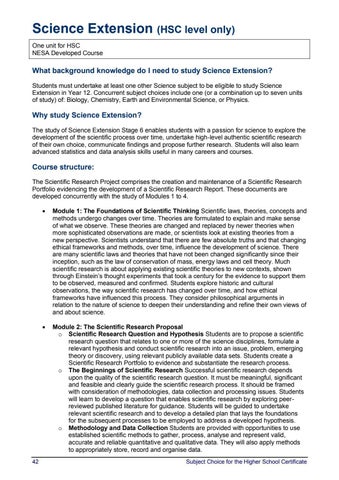Science Extension (HSC level only) One unit for HSC NESA Developed Course
What background knowledge do I need to study Science Extension? Students must undertake at least one other Science subject to be eligible to study Science Extension in Year 12. Concurrent subject choices include one (or a combination up to seven units of study) of: Biology, Chemistry, Earth and Environmental Science, or Physics.
Why study Science Extension? The study of Science Extension Stage 6 enables students with a passion for science to explore the development of the scientific process over time, undertake high-level authentic scientific research of their own choice, communicate findings and propose further research. Students will also learn advanced statistics and data analysis skills useful in many careers and courses.
Course structure: The Scientific Research Project comprises the creation and maintenance of a Scientific Research Portfolio evidencing the development of a Scientific Research Report. These documents are developed concurrently with the study of Modules 1 to 4.
42
•
Module 1: The Foundations of Scientific Thinking Scientific laws, theories, concepts and methods undergo changes over time. Theories are formulated to explain and make sense of what we observe. These theories are changed and replaced by newer theories when more sophisticated observations are made, or scientists look at existing theories from a new perspective. Scientists understand that there are few absolute truths and that changing ethical frameworks and methods, over time, influence the development of science. There are many scientific laws and theories that have not been changed significantly since their inception, such as the law of conservation of mass, energy laws and cell theory. Much scientific research is about applying existing scientific theories to new contexts, shown through Einstein’s thought experiments that took a century for the evidence to support them to be observed, measured and confirmed. Students explore historic and cultural observations, the way scientific research has changed over time, and how ethical frameworks have influenced this process. They consider philosophical arguments in relation to the nature of science to deepen their understanding and refine their own views of and about science.
•
Module 2: The Scientific Research Proposal o Scientific Research Question and Hypothesis Students are to propose a scientific research question that relates to one or more of the science disciplines, formulate a relevant hypothesis and conduct scientific research into an issue, problem, emerging theory or discovery, using relevant publicly available data sets. Students create a Scientific Research Portfolio to evidence and substantiate the research process. o The Beginnings of Scientific Research Successful scientific research depends upon the quality of the scientific research question. It must be meaningful, significant and feasible and clearly guide the scientific research process. It should be framed with consideration of methodologies, data collection and processing issues. Students will learn to develop a question that enables scientific research by exploring peerreviewed published literature for guidance. Students will be guided to undertake relevant scientific research and to develop a detailed plan that lays the foundations for the subsequent processes to be employed to address a developed hypothesis. o Methodology and Data Collection Students are provided with opportunities to use established scientific methods to gather, process, analyse and represent valid, accurate and reliable quantitative and qualitative data. They will also apply methods to appropriately store, record and organise data. Subject Choice for the Higher School Certificate
